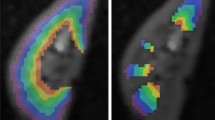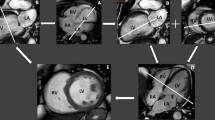Abstract
Purpose
Principles of magnetic resonance imaging techniques providing perfusion-related contrast weighting without administration of contrast media are reported and analysed systematically. Especially common approaches to arterial spin labelling (ASL) perfusion imaging allowing quantitative assessment of specific perfusion rates are described in detail. The potential of ASL for perfusion imaging was tested in several types of tissue.
Methods
After a systematic comparison of technical aspects of continuous and pulsed ASL techniques the standard kinetic model and tissue properties of influence to quantitative measurements of perfusion are reported. For the applications demonstrated in this paper a flow-sensitive alternating inversion recovery (FAIR) ASL perfusion preparation approach followed by true fast imaging with steady precession (true FISP) data recording was developed and implemented on whole-body scanners operating at 0.2, 1.5 and 3 T for quantitative perfusion measurement in various types of tissue.
Results
ASL imaging provides a non-invasive tool for assessment of tissue perfusion rates in vivo. Images recorded from kidney, lung, brain, salivary gland and thyroid gland provide a spatial resolution of a few millimetres and sufficient signal to noise ratio in perfusion maps after 2–5 min of examination time.
Conclusions
Newly developed ASL techniques provide especially high image quality and quantitative perfusion maps in tissues with relatively high perfusion rates (as also present in many tumours). Averaging of acquisitions and image subtraction procedures are mandatory, leading to the necessity of synchronization of data recording to breathing in abdominal and thoracic organs.









Similar content being viewed by others
References
Thews G, Vaupel P. Autonomic functions in human physiology. Berlin: Springer; 1985.
Prinzmetal M, Simkin B, Bergman HC, Kruger HE. Studies on the coronary circulation. II. The collateral circulation of the normal human heart by coronary perfusion with radioactive erythrocytes and glass spheres. Am Heart J 1947;33:420–42.
Hamlin RL, Marsland WP, Smith CR, Sapirstein LA. Fractional distribution of right ventricular output in the lungs of dogs. Circ Res 1962;10:763–6.
Kety SS, Schmidt CF. The nitrous oxide method for the quantitative determination of cerebral blood flow in man: theory, procedure and normal values. J Clin Invest 1948;27:476–83.
Ingvar DH, Lassen NH. Regional blood flow of the cerebral cortex determined by krypton85. Acta Physiol Scand 1962;54:325–38.
Ter-Pogossian MM, Phelps ME, Hoffman EJ, Mullani NA. A positron-emission transaxial tomograph for nuclear imaging (PETT). Radiology 1975;114:89–98.
Raichle ME, Martin WR, Herscovitch P, Mintun MA, Markham J. Brain blood flow measured with intravenous H2(15)O. II. Implementation and validation. J Nucl Med 1983;24:790–8.
Frackowiak RS, Lenzi GL, Jones T, Heather JD. Quantitative measurement of regional cerebral blood flow and oxygen metabolism in man using 15O and positron emission tomography: theory, procedure, and normal values. J Comput Assist Tomogr 1980;4:727–36.
Villringer A, Rosen BR, Belliveau JW, Ackerman JL, Lauffer RB, Buxton RB, et al. Dynamic imaging with lanthanide chelates in normal brain: contrast due to magnetic susceptibility effects. Magn Reson Med 1988;6:164–74.
Rosen BR, Belliveau JW, Vevea JM, Brady TJ. Perfusion imaging with NMR contrast agents. Magn Reson Med 1990;14:249–65.
Zierler KL. Theoretical basis of indicator-dilution methods for measuring flow and volume. Circ Res 1962;10:393–407.
Zierler KL. Equations for measuring blood flow by external monitoring of radioisotopes. Circ Res 1965;16:309–21.
Axel L. Cerebral blood flow determination by rapid-sequence computed tomography: theoretical analysis. Radiology 1980;137:679–86.
Le Bihan D, Breton E, Lallemand D, Grenier P, Cabanis E, Laval-Jeantet M. MR imaging of intravoxel incoherent motions: application to diffusion and perfusion in neurologic disorders. Radiology 1986;161:401–7.
Le Bihan D, Breton E, Lallemand D, Aubin M, Vignaud J, Laval-Jeantet M. Separation of diffusion and perfusion in intravoxel incoherent motion MR imaging. Radiology 1988;168:497–505.
Prasad PV, Edelman RR, Epstein FH. Noninvasive evaluation of intrarenal oxygenation with BOLD MRI. Circulation 1996;94:3271–5.
Norris DG. Principles of magnetic resonance assessment of brain function. J Magn Reson Imaging 2006;23:794–807.
Williams DS, Detre JA, Leigh JS, Koretsky AP. Magnetic resonance imaging of perfusion using spin inversion of arterial water. Proc Natl Acad Sci U S A 1992;89:212–6.
Detre JA, Leigh JS, Williams DS, Koretsky AP. Perfusion imaging. Magn Reson Med 1992;23:37–45.
Dixon WT, Du LN, Faul DD, Gado M, Rossnick S. Projection angiograms of blood labeled by adiabatic fast passage. Magn Reson Med 1986;3:454–62.
Pekar J, Jezzard P, Roberts DA, Leigh JS, Frank JA, McLaughlin AC. Perfusion imaging with compensation for asymmetric magnetization transfer effects. Magn Reson Med 1996;35:70–9.
Alsop DC, Detre JA. Multisection cerebral blood flow MR imaging with continuous arterial spin labeling. Radiology 1998;208:410–6.
Talagala SL, Barbier EL, Williams DS, Silva AC, Koretsky AP. Multi-slice perfusion MRI using continuous arterial water labeling controlling for MT effects with simultaneous proximal and distal RF irradiation. In: Proc 6th Annual Meeting ISMRM, Sydney; 1998.
Zhang WG, Silva AC, Williams DS, Koretsky AP. NMR measurement of perfusion using arterial spin labeling without saturation of macromolecular spins. Magn Reson Med 1995;33:370–6.
Pohmann R, Budde J, Auerbach EJ, Adriany G, Uğurbil K. Theoretical and experimental evaluation of continuous arterial spin labeling techniques. Magn Reson Med 2010;63:438–46.
Golay X, Hendrikse J, Tchoyoson CC. Perfusion imaging using arterial spin labeling. Top Magn Reson Imaging 2004;15:10–27.
Petersen ET, Zimine I, Ho YL, Golay X. Non-invasive measurement of perfusion: a critical review of arterial spin labelling techniques. Br J Radiol 2006;79:688–701.
Edelman RR, Siewert B, Darby DG, Thangaraj V, Nobre AC, Mesulam MM, et al. Quantitative mapping of cerebral blood flow and functional localization with echo-planar MR imaging and signal targeting with alternating radio-frequency. Radiology 1994;192:513–20.
Wong EC, Buxton RB, Frank LR. Implementation of quantitative perfusion imaging techniques for functional brain mapping using pulsed arterial spin labeling. NMR Biomed 1997;10:237–49.
Golay X, Stuber M, Pruessmann KP, Meier D, Boesiger P. Transfer insensitive inversion technique (TILT): application to multislice functional perfusion imaging. J Magn Reson Imaging 1999;9:454–61.
Kwong KK, Chesler DA, Weisskoff RM, Donahue KM, Davis TL, Ostergaard L, et al. MR perfusion studies with T1-weighted echo planar imaging. Magn Reson Med 1995;34:878–87.
Kim SG. Quantification of relative cerebral blood flow change by flow-sensitive alternating inversion recovery (FAIR) technique: application to functional mapping. Magn Reson Med 1995;34:293–301.
Schwarzbauer C, Morrissey SP, Haase A. Quantitative magnetic resonance imaging of perfusion using magnetic labeling of water proton spins within the detection slice. Magn Reson Med 1996;35:540–6.
Helpern JA, Branch CA, Yongbi M, Huang N. Perfusion imaging by un-inverted flow-sensitive inversion recovery (UNFAIR). Magn Reson Imaging 1997;15:135–9.
Berr SS, Mai VM. Extraslice spin tagging (EST) magnetic resonance imaging for the determination of perfusion. J Magn Reson Imaging 1999;9:146–50.
Zhou J, Mori S, van Zijl PC. FAIR excluding radiation damping (FAIRER). Magn Reson Med 1998;40:712–9.
Mai VM, Berr SS. MR perfusion imaging of pulmonary parenchyma using pulsed arterial spin labeling techniques: FAIRER and FAIR. J Magn Reson Imaging 1999;9:483–7.
Lai S, Wang J, Jahng GH. FAIR exempting separate T(1) measurement (FAIREST): a novel technique for online quantitative perfusion imaging and multi-contrast fMRI. NMR Biomed 2001;14:507–16.
Hendrikse J, van der Grond J, Lu H, van Zijl PC, Golay X. Flow territory mapping of the cerebral arteries with regional perfusion MRI. Stroke 2004;35:882–5.
Edelman RR, Chen Q. EPISTAR MRI: Multislice mapping of cerebral blood flow. Magn Reson Med 1998;40:800–5.
Ogg RJ, Kingsley PB, Taylor JS. WET, a T1- and B1-insensitive water-suppression method for in vivo localized 1H NMR spectroscopy. J Magn Reson B 1994;104:1–10.
Golay X, Petersen ET, Hui F. Pulsed star labeling of arterial regions (PULSAR): a robust regional perfusion technique for high field imaging. Magn Reson Med 2005;53:15–21.
Petersen ET, Lim T, Golay X. Model-free arterial spin labeling quantification approach for perfusion MRI. Magn Reson Med 2006;55:219–32.
Gowland P, Mansfield P. Accurate measurement of T1 in vivo in less than 3 seconds using echo-planar imaging. Magn Reson Med 1993;30:351–4.
Luh WM, Wong EC, Bandettini PA, Hyde JS. QUIPSS II with thin-slice TI1 periodic saturation: a method for improving accuracy of quantitative perfusion imaging using pulsed arterial spin labeling. Magn Reson Med 1999;41:1246–54.
Buxton RB, Frank LR, Wong EC, Siewert B, Warach S, Edelman RR. A general kinetic model for quantitative perfusion imaging with arterial spin labeling. Magn Reson Med 1998;40:383–96.
Wong EC, Buxton RB, Frank LR. Quantitative imaging of perfusion using a single subtraction (QUIPSS and QUIPSS II). Magn Reson Med 1998;39:702–8.
Chen Q, Siewert B, Bly BM, Warach S, Edelman RR. STAR-HASTE: perfusion imaging without magnetic susceptibility artifact. Magn Reson Med 1997;38:404–8.
Karger N, Biederer J, Lüsse S, Grimm J, Steffens JC, Heller M, et al. Quantitation of renal perfusion using arterial spin labeling with FAIR-UFLARE. Magn Reson Imaging 2000;18:641–7.
Tsekos NV, Zhang F, Merkle H, Nagayama M, Iadecola C, Kim S. Quantitative measurements of cerebral blood flow in rats using the FAIR technique: correlation with previous iodoantipyrine autoradiographic studies. Magn Reson Med 1998;39:564–73.
Oppelt A, Graumann R, Barfuss H, Fischer H, Hartl W, Schajor W. FISP: eine neue schnelle Pulssequenz für die Kernspintomographie. Electromedica 1986;54:15–8.
Martirosian P, Schick F, Klose U, Ludescher B, Mader I. Renal perfusion MRI rivals contrast studies. Diagn Imaging Eur 2003;51:31–7.
Martirosian P, Klose U, Mader I, Schick F. FAIR true-FISP perfusion imaging of the kidneys. Magn Reson Med 2004;51:353–61.
Boss A, Martirosian P, Graf H, Claussen CD, Schlemmer HP, Schick F. High resolution MR perfusion imaging of the kidneys at 3 Tesla without administration of contrast media. Rofo 2005;177:1625–30.
Fenchel M, Martirosian P, Langanke J, Giersch J, Miller S, Stauder N, et al. Perfusion MR imaging with FAIR true FISP spin labeling in patients with and without renal artery stenosis: initial experience. Radiology 2006;238:1013–21.
Martirosian P, Boss A, Fenchel M, Deimling M, Schäfer J, Claussen CD, et al. Quantitative lung perfusion mapping at 0.2 T using FAIR True-FISP MRI. Magn Reson Med 2006;55:1065–74.
Boss A, Martirosian P, Claussen CD, Schick F. Quantitative ASL muscle perfusion imaging using a FAIR-TrueFISP technique at 3.0 T. NMR Biomed 2006;19:125–32.
Schraml C, Boss A, Martirosian P, Schwenzer NF, Claussen CD, Schick F. FAIR true-FISP perfusion imaging of the thyroid gland. J Magn Reson Imaging 2007;26:66–71.
Schraml C, Schwenzer NF, Martirosian P, Claussen CD, Schick F. Perfusion imaging of the pancreas using an arterial spin labeling technique. J Magn Reson Imaging 2008;28:1459–65.
Schwenzer NF, Schraml C, Martirosian P, Boss A, Claussen CD, Schick F. MR measurement of blood flow in the parotid gland without contrast medium: a functional study before and after gustatory stimulation. NMR Biomed 2008;21:598–605.
Martirosian P, Schick F, Klose U. True-FISP sequences applied for data recording in FAIR perfusion imaging. In: Proc 9th Annual Meeting ISMRM, Glasgow; 2001. p. 1560.
Boss A, Martirosian P, Klose U, Nägele T, Claussen CD, Schick F. FAIR-TrueFISP imaging of cerebral perfusion in areas of high magnetic susceptibility differences at 1.5 and 3 Tesla. J Magn Reson Imaging 2007;25:924–31.
Schick F. Whole-body MRI at high field: technical limits and clinical potential. Eur Radiol 2005;15:946–59.
Deimling M. True FISP imaging of lung parenchyma at 0.2 T. In: Proc 8th Annual Meeting ISMRM, Denver; 2000. p. 2002.
Bell BA. A history of the study of the cerebral circulation and the measurement of cerebral blood flow. Neurosurgery 1984;14:238–46.
Conflicts of interest
None.
Author information
Authors and Affiliations
Corresponding author
Rights and permissions
About this article
Cite this article
Martirosian, P., Boss, A., Schraml, C. et al. Magnetic resonance perfusion imaging without contrast media. Eur J Nucl Med Mol Imaging 37 (Suppl 1), 52–64 (2010). https://doi.org/10.1007/s00259-010-1456-7
Published:
Issue Date:
DOI: https://doi.org/10.1007/s00259-010-1456-7




